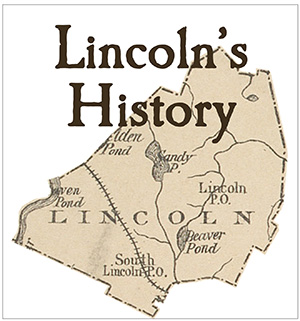By Craig Donaldson
During the summer of 1774, citizens of Lincoln were wrestling with a momentous decision. Earlier in the year, the British Parliament imposed draconian measures to control the increasingly restive citizenry of Boston and Massachusetts. The Coercive Acts were passed in May, closing Boston Harbor and ending self-government in the colony. Town meetings including Lincoln’s were limited to one annual session for electing town officers and assigning taxes. No other issues could be discussed unless approved by the royal governor.
Official copies of the Coercive Acts had arrived in Boston in July and were promptly imposed by the newly appointed royal governor, General Thomas Gage. When the elected Massachusetts legislature met to protest the acts, General Gage dissolved the legislature. In August 1774, Gage attempted to appoint his own governing council, but patriots applied “persuasion” and convinced the appointees to resign.
Across the colony, these developments stirred debate around dinner tables and in meeting houses, taverns, and churches. At stake was the willingness of each citizen to defy laws handed down by Parliament and enforced by arbitrary authorities without representation or consent from those subject to the laws.
Years before, in response to the Stamp Act in 1765, patriots had responded by refusing to buy British goods. The strategy seemed to work then, so in June 1774, Boston’s Committee of Correspondence once again called upon all towns to adopt a pledge not to purchase or consume any British goods. In response, Lincoln’s Committee of Correspondence, established by Town Meeting in November 1773, drafted a pledge in August 1774 for all adult men to sign:
“We the Subscriber Inhabitants of the Town of Lincoln do sincerely and truly covenant and agree to and with each other that we will not for ourselves or any for or under us, purchase or consume any Goods, Wares or Manufactures which shall be imported from Great Britain after the thirty first day of August seventeen hundred and seventy four, until the Congress of Deputies from the Several Colony shall determine what articles if any to except, that we will thereafter, respecting Use and Consumption of such British articles as may not be excepted, religiously abide by the Determinations of said Congress.”
When it came time to sign the pledge, 77 of the estimated 120 adult men stepped forward and put their names on the document. Though by no means universally supported, this pledge put a majority of the voters of Lincoln in active public defiance of British rule.
Addendum by Donald Hafner of the Lincoln Historical Society:
At the time when the Sons of Liberty were urging non-purchase and non-consumption of British goods, the word “boycott” had not yet entered the English language. That would not occur until a century later, in 1880, when Irish farm laborers refused to work for George C. Boycott, the agent of an absentee landlord. You only have to say “non-purchase/non-consumption” once or twice before you realize what a great invention “boycott” was. Meanwhile, historical re-enactors who turn out in 18th-century garb struggle to stop our tongues before using the word. If only Samuel Adams had given us something better than “non-purchase/non-consumption.”
“Lincoln’s History” is an occasional column by members of the Lincoln Historical Society.

Leave a Reply